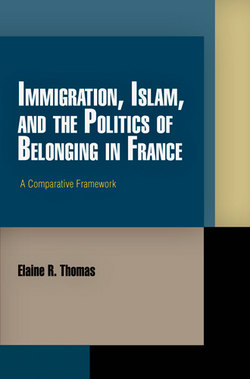Читать книгу Immigration, Islam, and the Politics of Belonging in France - Elaine R. Thomas - Страница 7
ОглавлениеPreface
This study originally emerged from an interest in what is now generally referred to as “globalization.” I wanted to complement study of its financial and economic dimensions with a new sort of critical investigation of its conceptual and political impact. How international migration, and political responses to it, contributed to reshaping ideas of citizenship and political belonging initially presented itself as a compelling window onto such broader global developments, and this book is addressed in part to all concerned with the changes wrought by them. As the project evolved over time, I confess to having become increasingly drawn to, and politically concerned with, my immediate object of study: immigrant integration policy and politics in contemporary Europe, and particularly in France where I began by spending almost two years living, studying, and conducting research as an SSRC-MacArthur Fellow in the mid-1990s.
In the wake of September 11 and its aftermath, the research and writing I had first done on this topic at the University of California, Berkeley, unexpectedly took on a new kind of pertinence and significance as issues of whether European countries’ Muslim populations would be integrated on “western” terms became increasingly salient. My hope is that the original conceptual framework and approach introduced in this book, first developed for the analytic purpose of clarifying comparisons of ideas of political membership across space and over time, may now also prove constructive as a partial counterweight to the understandable but often unfortunately inflammatory tendency for discussion of such issues to take on a far more polemical cast. The tools of ordinary language analysis employed in this book are by nature tools of cultural self-reflection. They thus reveal the part that our own unresolved conceptual confusions play in shaping crises arising from encounters with those experienced as “troubling others.”
Most of Parts II and III trace the interaction between policy debate and contested concepts in France. It is therefore to be expected that the text will prove of particular interest to scholars and others interested in contemporary French politics. That said, the book introduces a perspective and approach that I believe can be also used to make sense of a variety of other developments. The final chapters illustrating a few such applications are by no means intended to be exhaustive but rather, by design, open-ended. Readers may also, I think and hope, find the theoretical framework relevant to developments in the United States and other areas.
